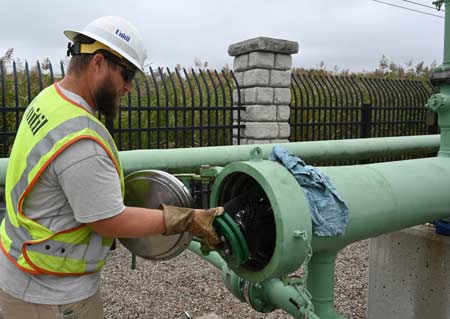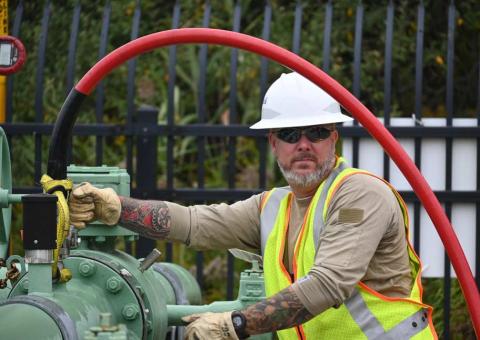Pig runs, pigging, and piggability.
These peculiar words may sound like they’re describing the pandemonium during a pig scramble at the county fair, but they actually refer to an innovative maintenance technique that helps ensure the safety of natural gas pipelines like the Granite State Gas Transmission Line.
Unitil, a provider of electricity and natural gas to customers in New England, is in the process of performing a series of pig runs, which involve the cleaning and inspection of pipeline using specialty tools to identify threats like corrosion, dents, cracks and other damage that could impact the safety and integrity of the system.
The procedure, which is done every seven years, earned the name “pig run” many years ago because the tools that are inserted into the pipes, which are known as pigs, often make squealing sounds as the brushes hit the steel wall and travel slowly through the line.
So-called “smart pigs” are equipped with sensors and data recording devices and are propelled through the pipeline by gas, moving at a speed of approximately 3 mph.
“Most people outside of the gas industry have probably never heard of a pig run, but this process is essential to our goal of safely and reliably delivering natural gas to our customers. This procedure helps clean and maintain flow, enhance efficiency, and ensure the overall stability of our pipeline system,” said Unitil External Affairs Manager Amanda Vicinanzo.
Unitil’s most recent pig run took place in Greenland, N.H., where a pig was launched from the company’s gas facility along Route 33. The device was placed in the pipe and traveled for three miles, ending its run in Portsmouth.
 Before the pig run could begin, workers had to remove some gas through recompression – a process that involves the use of a portable unit that safely captures natural gas and transfers it from one pipeline to another rather than releasing it directly into the atmosphere. The process minimizes greenhouse gas emissions when natural gas must be safely removed from a segment of pipeline that’s being replaced or undergoing other work.
Before the pig run could begin, workers had to remove some gas through recompression – a process that involves the use of a portable unit that safely captures natural gas and transfers it from one pipeline to another rather than releasing it directly into the atmosphere. The process minimizes greenhouse gas emissions when natural gas must be safely removed from a segment of pipeline that’s being replaced or undergoing other work.
Data collected from the pig run will be reviewed and will help guide future maintenance and remediation projects on the transmission line.
Additional pig runs to clean and examine other sections of pipeline will be held this fall. The segments of pipe to be inspected vary from a few miles to more than 30 miles in length.
The pig runs are all being conducted on the Granite State Gas Transmission Line, which is an 86-mile interstate natural gas pipeline operated by Unitil that extends from the Massachusetts/New Hampshire border through New Hampshire’s Seacoast region to Portland, Maine. The company is making infrastructure improvements in order to make the entire pipeline “piggable” – meaning all sections can accommodate cleaning and inspection pigs – for safety and integrity management.
The recent pig run in Greenland followed one performed in May when Unitil launched a pigging tool in a section of pipeline that runs from Haverhill, Mass., to the facility in Greenland.


